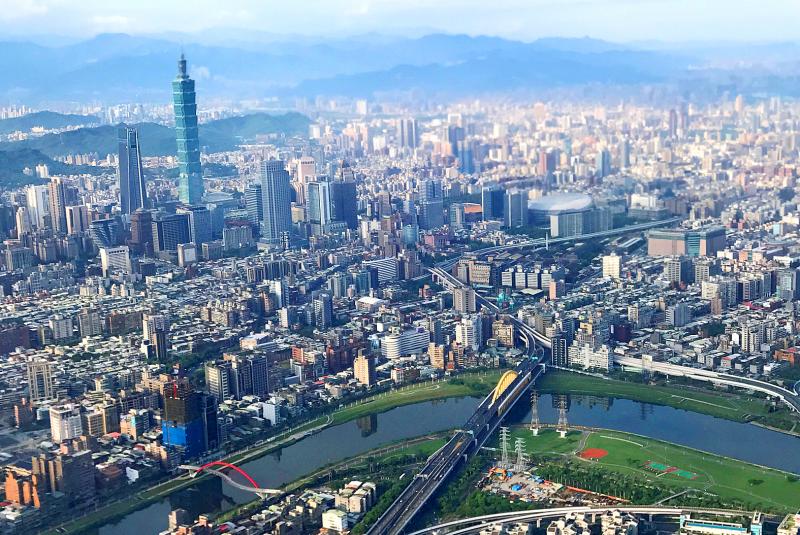More Hong Kongers purchased real estate in Taiwan last year than other foreigners, Ministry of the Interior statistics showed.
The ministry attributed the spike to a proposed extradition law that the Hong Kong government submitted last year, which would have allowed suspects to be sent to China and other nations, which sparked mass protests that are continuing.
The rate of purchases last year by Hong Kong natural and juridical persons stood at 40 and 60 percent respectively, with building area purchased by both standing at 47.41 percent and 52.59 percent respectively, ministry data showed.

Photo: Tyrone Siu, Reuters
Department of Land Administration statistics showed that Hong Kongers purchased 11,200 ping (37,025m2) in total land area, a new high for Hong Kongers’ real estate purchases.
The British Virgin Islands were second with 3,102 ping, with Belize in third with 2,210 ping, Malaysia with 1,358 ping and US nationals or companies in fifth place with 1,185 ping, the statistics showed.
Hong Kongers’ land area purchases exceed those of other countries by 1.43 times, the statistics showed.
In terms of building area, Hong Kongers purchased 48,000 ping, the British Cayman Islands nearly 20,000 ping, the Virgin Islands about 9,600 ping, the US nearly 8,000 ping and Malaysia more than 5,300 ping, the data showed.
The department said that purchases from the Virgin and Cayman islands were made through juridical persons.
Realtors in the know said that many Taiwanese companies have established subsidiary firms in the Virgin and Cayman islands, so the actual purchasers could be Taiwanese companies using a different name.
The difference between those purchases and those made by natural and juridical persons from Hong Kong is that the former are making investments while the latter are considering moving to Taiwan, they said.
Sinyi Realty corporate realty research project manager Tseng Ching-te (曾敬德) said statistics show that the spike in Hong Konger purchases is due to similar living habits and lack of a communications barrier.
The ongoing difficulties in Hong Kong are another reason, with retirees in the majority of those purchasing realty in Taiwan, he said.
National Immigration Agency data showed that there were about 2,000 applications from Hong Kongers for temporary residence before the 2008 financial crisis, but the numbers grew from about 4,574 in early 2014 to 7,506 after the pro-democracy “Umbrella movement” in Hong Kong later that year — a 64 percent increase.
REPro Knight Frank Taiwan Research and Consultancy head Andy Huang (黃舒衛) said there is a clear trend of Hong Kongers investing in Taiwan for political and social reasons.
Regardless of investment, immigration or realty purchasing, or culturally related issues such as culture, Hong Kongers view Taiwan favorably and in an attractive light, he said.
Should Taiwan become more internationalized and offer more jobs, there could be an even bigger influx of Hong Kong capital, he said.

The Ministry of Education (MOE) is to launch a new program to encourage international students to stay in Taiwan and explore job opportunities here after graduation, Deputy Minister of Education Yeh Ping-cheng (葉丙成) said on Friday. The government would provide full scholarships for international students to further their studies for two years in Taiwan, so those who want to pursue a master’s degree can consider applying for the program, he said. The fields included are science, technology, engineering, mathematics, semiconductors and finance, Yeh added. The program, called “Intense 2+2,” would also assist international students who completed the two years of further studies in

Former president Tsai Ing-wen (蔡英文) departed for Europe on Friday night, with planned stops in Lithuania and Denmark. Tsai arrived at Taiwan Taoyuan International Airport on Friday night, but did not speak to reporters before departing. Tsai wrote on social media later that the purpose of the trip was to reaffirm the commitment of Taiwanese to working with democratic allies to promote regional security and stability, upholding freedom and democracy, and defending their homeland. She also expressed hope that through joint efforts, Taiwan and Europe would continue to be partners building up economic resilience on the global stage. The former president was to first

Taiwan will now have four additional national holidays after the Legislative Yuan passed an amendment today, which also made Labor Day a national holiday for all sectors. The Chinese Nationalist Party (KMT) and Taiwan People’s Party (TPP) used their majority in the Legislative Yuan to pass the amendment to the Act on Implementing Memorial Days and State Holidays (紀念日及節日實施辦法), which the parties jointly proposed, in its third and final reading today. The legislature passed the bill to amend the act, which is currently enforced administratively, raising it to the legal level. The new legislation recognizes Confucius’ birthday on Sept. 28, the

MORE NEEDED: Recall drives against legislators in Miaoli’s two districts and Hsinchu’s second district were still a few thousand signatures short of the second-stage threshold Campaigners aiming to recall Chinese Nationalist Party (KMT) legislators yesterday said they expect success in 30 out of 35 districts where drives have passed the second-stage threshold, which would mark a record number of recall votes held at once. Hsinchu County recall campaigners yesterday announced that they reached the second-stage threshold in the recall effort against Legislator Lin Szu-ming (林思銘). A total of 26,414 signatures have been gathered over the past two months, surpassing the 10 percent threshold of 23,287 in Hsinchu County’s second electoral district, chief campaigner Hsieh Ting-ting (謝婷婷) said. “Our target is to gather an additional 1,500 signatures to reach